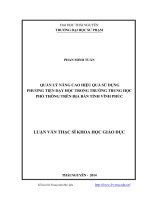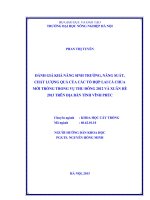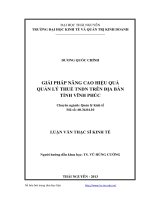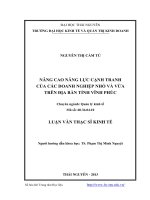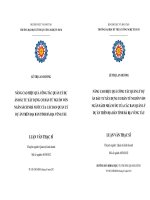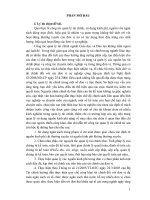Nâng cao khả năng giao tiếp cho các nhà quản lý giáo dục trên địa bàn tỉnh vĩnh phúc cơ sở cho các chương trình đào tạo
Bạn đang xem bản rút gọn của tài liệu. Xem và tải ngay bản đầy đủ của tài liệu tại đây (1.08 MB, 125 trang )
ENHANCING THE COMMUNICATION SKILLS OF
EDUCATIONAL MANAGERS IN VINH PHUC PROVINCE:
BASIS FOR A TRAINING PROGRAM
A Dissertation Presented to
the Faculty of the Graduate School
Southern Luzon State University, Lucban Quezon, Philippines
In Collaboration with
Thai Nguyen University, Socialist Republic of Vietnam
In Partial Fulfillment
of the Requirements for the Degree of
Doctor in Education Management
By
HOANG VAN BINH - PEACE
March 2014
i
APPROVAL SHEET
i
DEDICATION
This piece of work is dedicated
To My Family
ii
ACKNOWLEDGMENT
The researcher wishes to extend her most sincere gratitude to the following
people who made this piece of work a reality.
Dr. Cecilia N. Gascon, President of Southern Luzon State University, Republic
of the Philippines, who made possible the linkage with Thai Nguyen University and
the offering of Doctor in Education Management, through the ITC-TUAF;
Dr. Dang Kim Vui, the President of Thai Nguyen University, who made the
linkage with Southern Luzon State University, Republic of the Philippines and the
offering of Doctor of Education Management, through the ITC-TUAF;
Dr. Ricaryl Catherine P. Cruz, for her support and supervision throughout my
graduate study program. Her kindness and daily instructions in the last three years are
greatly appreciated and this dissertation is as much her work as mine;
Prof. Nordelina Ilano, Director, Office for International Affairs of URS for her
support to the Ph.D.Ed.M students;
Dr. Tran Thanh Van, the Dean of the Graduate School of Thai Nguyen
University, for his assistance and encouragement to pursue this study;
Dr. Dang Xuan Binh, the Director of International Training Center, for his
assistance and encouragement to pursue this study;
Dr. Nguyen Thanh Hai, the Vice Director of International Training Center, for
his assistance and encouragement to pursue this study as Ph.D.Ed.M Class Manager;
To all the SLSU and TNU Professors, for their support and guidance extended
throughout the graduate studies in Thai Nguyen University, Vietnam;
To his ever dearest friends for their kindness and remarkable support;
To his family, for their support, encouragement for being the sources of
greatest inspiration, which made his career a success.
iii
ABSTRACT
In management psychology, humans are considered central factors, throughout
the management process. People are the subjects as well as the objects of the
management relationships. In management, the psychological contact between
officials or managers (to communicate) and the major management objects -
individual and collective (communication objects) is management communication, it
is the basic content of the management. To establish relationships with management
objects, to deal with management tasks, to maintain management functions,
management staff should have the psychological traits and communication ability in
certain management in which communication ability are the most basic elements. In
fact, there have not been studies on communication ability of leaders in general and
Vinh Phuc province in particular. So the study focuses on communication ability of
educational leaders is very useful.
Vinh Phuc is a newly re-established province, but has rapidly developed and
shown to be a dynamic province during the period of industrialization and integration.
One of the causes leading to the development is educational leaders in Vinh Phuc. It
expresses that the educational leaders have vision, depth, leadership, communication
ability to get the right policies to promote the education and socio-economic
development in recent years; however there are some inevitable weaknesses.
Therefore, improving the communication ability for educational leaders is necessary.
Recognizing the problem, the researcher decided to conduct a study on
communication ability of educational leaders to point out the strengths and
limitations. The researcher also gives solutions to improve psychological quality,
leadership, communication ability of educational leaders to make a rapid development
in Vinh Phuc province on the path of industrialization and international integration.
Keywords: Education, Ability, Leaders, Skills, Interpersonal, Emotional,
Sensitivity, Flexibility, Persuasive, Problem solving.
iv
TABLE OF CONTENTS
TITLE PAGE Page
APPROVAL SHEET ii
DEDICATION iii
ACKNOWLEDGMENT iv
ABSTRACT v
TABLE OF CONTENTS viii
ABBREVIATION x
LIST OF TABLES xi
LIST OF FIGURES xiii
CHAPTER
1 INTRODUCTION………………………………………………………………1
Background of the Study 2
Objective of the Study 3
Hypothesis of the Study 4
Significance of the Study 4
Scope and Limitation of the Study 5
Definition of Terms 6
2 REVIEW OF RELATED LITERATURE AND STUDIES . . . . . . . . . . . . . . 8
Related Literature 8
Related Studies 46
Conceptual Framework 53
3 METHODOLOGY… 54
Locale of the Study 54
v
Research Design 55
Population of the Study 55
Instruments 56
Data Gathering Procedure 57
Statistical Treatment 57
4 RESULTS AND DISCUSSION… 60
Respondents Profile 60
Respondents' Perception about communication ability 63
Analysis of factors influencing communication ability of educational leaders 76
Comparison of respondent’s perception by personal profile 80
Proposal Training Programs 91
5 SUMMARY OF FINDINGS, CONCLUSIONS AND RECOMMENDATIONS.104
Summary of Findings 104
Conclusions 105
Recommendations 106
BIBLIOGRAPHY 107
QUESTIONNAIRE 110
vi
ABBREVIATION
ANOVA Analysis of Variance
ES Emotional skills
FS Flexibility skills
IC Interpersonal communication
PCS Persuasive communication skills
PSS Problem solving skills
SWOT Strengths-Weaknesses-Opportunities-Threats
SPSS Statistical Package for Social Sciences
SS Sensitivity skills
VIF Variance inflation factor
WM Weighted Mean
vii
LIST OF TABLES
Table
Page
1 Distribution of Respondents
56
2
Title of the table
56
3
Frequency and Percentage Distribution of Respondents Profile in
terms of Age and Gender
60
4
Frequency and Percentage Distribution of Respondents Profile in
terms of Educational Qualification
61
5
Frequency and Percentage Distribution of Respondents Profile in
terms of Length of Work Experience
61
6
Frequency and Percentage Distribution of Respondents Profile in
terms of Number of Years in Management
62
7
Reliability statistics on Interpersonal communication skills
63
8
Mean Distribution of Respondents Perception in Terms of
Interpersonal Communication skills
64
9
Reliability statistics on Emotional skills
65
10
Mean Distribution of Respondents Perception in Terms of
Emotional skills
11 Reliability statistics on Sensitivity skills 67
12 Mean Distribution of Respondents Perception in Terms of
Sensitivity skills
68
13 Reliability statistics on Flexibility skills 69
14
Mean Distribution of Respondents Perception in Terms of
70
viii
Flexibility skills
15 Reliability statistics on Persuasive communication skills 71
16 Mean Distribution of Respondents Perception in Terms of
Persuasive communication skills 72
17 Reliability statistics on Problem solving skills in communication
process 73
18 Mean Distribution of Respondents Perception in Terms of
Problem solving skills in communication process
74
19 Mean distribution of respondents’ perception in terms of average
evaluation following citizen
75
20 Descriptive statistics 76
21 ANOVA analysis 77
22 Result regression 78
23 Hypothesis Testing 80
24
Comparisons of respondent’s perception according to profile
81
25 Test homogeneity of variances in term of age 82
26 ANOVA analysis in term of age 83
27 Test homogeneity of variances in term of work experiences 84
28 ANOVA analysis in term of work experiences 85
29 Test homogeneity of variances in term of number of years in
management 86
30 ANOVA analysis in term of number of years in management 87
31 Test homogeneity of variances in term of Educational qualification 88
32 ANOVA analysis in term of Educational qualification 89
33 The Independent Sample Test in term of gender 90
ix
LIST OF FIGURE
Figure Page
1 Communication Process 15
2 Face to face Communication 16
3 Conceptual Framework Showing the Communication Ability of
Educational Leaders in Vinh Phuc Province
53
4 Map of Vinh Phuc Province 55
2
Chapter 1
INTRODUCTION
In management psychology, humans are considered central factors, throughout
the management process. People are the subjects as well as the objects of the
management relationships. In management, the psychological contact between
officials or managers (to communicate) and the major management objects -
individual and collective (communication objects) is management communication, it
is the basic content of the management. To establish relationships with management
objects, to deal with management tasks, to maintain management functions,
management staff should have the psychological traits and communication ability in
certain management in which communication ability are the most basic elements. In
fact, there have not been studies on communication ability of leaders in general and
Vinh Phuc province in particular. So the study focuses on communication ability of
educational leaders is very useful.
Face with the changes of current management, management officials need to
be trained regularly on business theory and management (including thematic
communication management), to be standardized in all aspects especially
communication ability in management.
With the research "Enhancing the Communication Skills of Educational
Managers in Vinh Phuc province: Basis for a training program", the researcher
would like to contribute a part of the theory and practice in building communication
ability for educational leaders.
2
Background of the Study
Scientific revolution and modern technology have accelerated the pace of
globalization, creating breakthrough, is a luggage for men to walk into the new
millennium. It is said that globalization is an inevitable trend in the development of
human society.
With the rapid change and the diversity of society, communication behavior in
general, and culture behavior in particular is an important issue in human activity in
the relationship between the community and particularly in leadership management.
Weaknesses in communication are the cause of society's opinion which is not good
for public officials and employees in the system of government.
Vinh Phuc is a newly re-established province, but has rapidly developed and
shown to be a dynamic province during the period of industrialization and integration.
One of the causes leading to the development is educational leaders in Vinh Phuc. It
expresses that the educational leaders have vision, depth, leadership, communication
ability to get the right policies to promote the education and socio-economic
development in recent years; however there are some inevitable weaknesses.
Therefore, improving the communication ability for educational leaders is necessary.
Recognizing the problem, the researcher decided to conduct a study on
communication ability of educational leaders to point out the strengths and
limitations. The researcher also gives solutions to improve psychological quality,
leadership, communication ability of educational leaders to make a rapid development
in Vinh Phuc province on the path of industrialization and international integration.
3
Objective of the Study
This study was conducted to assess the communication ability of the
educational leaders in Vinh Phuc Province.
Specifically, it aims to:
1. Describe the profile of the respondents as to:
1.1. Age
1.2. Gender
1.3. Educational qualification
1.4. Position
1.5. Length of work experiences
1.6. Number of years in management
2. Determine respondents’ perception about communication ability of the
educational leaders in Vinh Phuc province in terms of:
2.1. Interpersonal communication skills
2.2. Emotional skills
2.3. Sensitivity skills
2.4. Flexibility skills
2.5. Persuasive communication skills
2.6. Problem solving skills in communication process
3. Ascertain the relation of the profile of the educational leaders with their
communication ability in terms of:
3.1. Interpersonal communication skills
3.2. Emotional skills
3.3. Sensitivity skills
3.4. Flexibility skills
4
3.5. Persuasive communication skills
3.6. Problem solving skills in communication process
4. Develop a training program derived from the study hypothesis.
Hypothesis of the Study
The following null hypotheses were tested in the study:
There is no significant relationship between the profile of the educational
leaders and the communication ability in term of:
Interpersonal communication skills
Emotional skills
Sensitivity skills
Flexibility skills
Persuasive communication skills
Problem solving skills in communication process
Significance of the Study
Educational leaders, it can help educational leaders to improve
communication skills to make a contribution to the province’s socio-economic
development.
Future researchers, this study could provide references for future proponents
who wish to venture a study similar to the nature of this research. Thus basic tenets on
leadership styles and dimensions on instructional variables could serve as resources
for other studies.
Researcher, moreover, this study would be essential to the researchers since it
would give them new learning experiences and applications of the theories and
concepts.
5
Students, This study may benefit the students since they are the main
concerns of the educators and any wholesome environment and relationship would
create positive effect on the teaching and learning process. It is hoped that the
findings of the study can bring understanding and harmonious relationship among
members of the school systems.
Teacher, the outcome of the study is of great help to teachers because they
were aware of the communication different types of leadership that would affect
changes and improvements of the school.
Scope and Limitation of the Study
The primary intent of this study was to further investigate the communication
ability of educational leaders to the proposed training program. There were two
hundred forty-three (243) educational leaders used as respondents in this study.
The communication ability are: interpersonal communication skills; emotional
skills; sensitivity skills; flexibility skills; persuasive communication skills and
problem solving skills in communication process.
Measurement of the communication ability of educational leaders was limited
in the use of questionnaires. Checklist questionnaire was developed for the purpose of
the study. The time frame of this study covered the period from April 2013 to
October 2013.
Definition of Terms
For clarity and better understanding of the study, the following terminologies
are hereby defined conceptually and operationally. According to Harper, Douglas
(2013) and Donald Clark (2013), definition about communication and its aspect can
be definited as below:
6
Communication Ability includes Interpersonal communication skills,
Emotional skills, Sensitivity skills, Flexibility skills, Persuasive communication skills,
and Problem solving skills in communication process and communication skill.
Communication is any act by which one person gives to or receives from another
person information about that person's needs, desires, perceptions, knowledge, or
affective states. Communication may be intentional or unintentional, may involve
conventional or unconventional signals, may take linguistic or nonlinguistic forms,
and may occur through spoken or other modes. Communication skills are the ability
to convey information to another effectively and efficiently.
Emotional skills refers to a person's ability to deal with, manage, express and
control his or her emotional states, including anger, sadness, excitement, anxiety and
joy.
Flexibility skills refer to ability to be easily modified to respond to altered
circumstances or conditions. It is also defined for a person as “ready and able to
change so as to adapt to different circumstances”.
Interpersonal skills are exchange of information between two or more people.
It is also an area of study. Related skills are learned and can be improved. During
interpersonal communication there is message sending and message receiving.
This can be conducted using both direct and indirect methods. Successful
interpersonal communication is when the message senders and the message
receivers understand the message.
Persuasive communication skills is the process of guiding people toward the
adoption of an idea, attitude, or action by rational and emotional means.
Problem solving skills consists of using generic or ad hoc methods, in an
orderly manner, for finding solutions to problems.
7
Sensitivity skills refer to ability to form give-and-take relationships which
enhance understanding and mutual respect, acknowledge the needs and feelings of
others being aware of how one’s own behavior affects others, and focus on the
positive aspects of conflict and values differences.
9
Chapter 2
REVIEW OF RELATED LITERATURE AND STUDIES
This chapter deals with the review of related literature and studies, conceptual/
theoretical framework and the research paradigm where the study builds about
Communication ability, Interpersonal communication skills, Emotional skills,
Sensitivity skills, Flexibility skills, Persuasive communication skills, and Problem
solving skills in communication process
RELATED LITERATURE
Communication in Management Leadership
The concept of communicative activities and interpersonal skills
The concept of communication
Communication is an activity that takes place regularly and continuously in
social life in the natural environment. From the baby stirred in the womb, shelled seed
germination, to vibrant life between man and man, man with the surrounding
environment are all manifestations of the communication activities.
Thus, communication is the actions, gestures, attitudes in the relationships of
the process of continuous movement between actors in social life and in the natural
environment.
After all, communication is the activity associated with the life and very close
to our lives. Thanks to communication that people stick together, understand each
other and co-exist and develop.
In other words, communication is the relationship between human beings
together in human society (the family, in offices, factories, in schools, in business, in
9
the market, the street, at the conference etc.) when people carry out production
activities, entertainment, recreation, learning, fighting, diplomacy, leadership, science,
politics, etc.)
Communication is in all human activities. From birth, people need to
communicate with humans, first with his mother, then his father, with the family to
learn to eat, talk, walk, sit, use widgets made by human invention. If people do not
have the communication, they will not be human.in int the history of science, it has
been more than 50 cases, newborn children are spared into the forest, animals raised,
and when they are found out, all of them do not speak, do not walk by two legs,
swallow raw Fresh, crawl on all fours, or roaring.
Depending on the extent of communication of each person, the soul, wisdom
is developed, rich.
The concept of communication
Communication skills is the ability to apply knowledge and use means of
communication on the perception of the external manifestations and your
psychological changes.
According to the A.A.Bodalov and A.N.Leonchiev (2008), the communication
has three phases: controlling phase, adjustment and development process of
communication; the communicative analysis system has be done; communication
modeling phase for the next operation. Based on this basis that one divides
communication skills into three groups.
Team-oriented skills: Being able to rely on external manifestation as nuanced
expressive intonation, tone, content, gestures, movements to judge exactly the
mentality within communication of the subject and object of communication. Group
10
segmentation skills are sub-divided into reading skills on facial expressions, gestures,
body language, words and perceptual skills transfer from the outer to the inner nature.
The positioning skills: is the ability to build model psychology, portrait
personality of the object. This is the ability to identify the position in communication,
to know to put his position on the position of the object to be happiness, sadness with
joy, their sadness and create conditions for the objects to communicate with her
actively.
Controlling group skills, adjusting the communication process: The subjects of
communication have suitable gestures, body languages, eye contact, smile, behavioral
responses with the object, context, purpose, content, communication tasks. "Know
yourself" - Socratic Greek philosopher once advised people like that. Knowing to
control the behaviour, emotions and feelings is reasonably aware of the limits of
behavior, the reaction of yourself. That is the nature of regulation (self-regulation).
Knowing to guide your behaviour, your response according to the purpose and
contents of communication tasks. It is the controlling process.
In order to control someone; you should understand his physiological
characteristics, his circumstances, his needs, his desires in certain conditions and
circumstances.
According A.T.Kyrbanova and Ph.M.Pakhmatylina, a communication process
consists of three groups of skills:
Group of team-oriented skills before communication.
Group of the exposure occurred skills in the communication process.
Group of unique skills show the communication process to the different value
orientations.
11
According to these authors, the skills of the above components are: Visual
Skill, listening skills, contact skills, mutual understanding; organizational skills to
control the communication process.
VPDakharov relied on the order of the steps of a communication phase that
communicative competence includes the following skills:
Interpersonal skills in communication relationships.
Balanced Skill between the needs of the subject and object of communication
Listening skills and listening to objects of communication.
Self-control emotional and behavioral skills.
Sensitive skills in communication.
Skills to express easily to understand.
Flexible skills, flexibility in communication.
Persuasive communication skills.
Skills of controlling communication process.
Self-control skills and test subjects of communication
In short, to help the communication process take place conveniently and
effectively, subjects of communication need to have enough 10 groups of skills.
The purpose of communication
When people communicate with each other for many different purposes,
depending on different purposes, depending on the purpose of the work, but the main
purpose of any communication process is also good.
a, Exchange emotional feelings, thoughts together.
Communication is a dual activity, the two subjects are conscious, they have
different emotional mind, there is always the change: this time people can play a key
12
role actively, and the other time they play the role of passive listening. Then there is a
back change.
So in the process of communication, the two entities who have different
emotional feelings will share happiness, sadness, and thoughts with each other. If the
catch is not good, there will lead to misunderstanding. Love is thought hate, hate is
thought love.
b, Any communication also aims to aware and understanding each other.
To do this, the two parties must be given the news and got the news, talking to
each other all the thought, love each other, and to collect all the news of each other,
listen to each other for all the words to come to any agreement in which person-to-
person relationship: friendship, love, husband and wife, father and son, friends,
colleagues, superiors, subordinates. This process requires each person to use all
communication channels: eyes and ears, nose, skin, memory, filters, (thinking) to
create accurate information, fit for the purpose, with objects and situations.
c, Communication always bring a specific content depending on the work or
activities of humans. For example, pedagogy activities, main content of
communication is scientific knowledge are presented in the lectures at class. In the
trading business, communication is mainly price content, goods In the management;
communication content is the order
d, Finally, communication must be a relationship between these people and
those ones: relatives or profile, leaders or subordinates, the good leader or bad leaders.
Characteristics of communication in the management of the management leaders
Communication in Management Leadership.
13
Based on the characteristics of management activities, the basic characteristics
- the nature of the communication have defined communication in management as
follows:
Communication in leadership management is the interaction between the
leaders with their superiors, management object and others in terms of psychology in
order to create mutual empathy in acquiring, processing communication
management, the implementation of the management functions.
Functions of communication
Function of oriented human activities:
When people communicate or interact with each other, they have clearly
intention by a certain orientation. The essence of exploration orientation is to aware of
the enemy, from which mutual adjustment acts, words or gestures.
Thus, the orientation requires an psychological art to cause sympathy, removes
the psychological barrier created difficult barrier to overcome in the process of
communication.
Function of reflective or cognitive:
This function is like the purpose of the communication so that the process of
communication is the process of collecting and receiving information, and then
processing information. This acquisition depends on who is capable of mobilizing all
the sensory organs to reflect: mouth, ears, smiling, arms, eye glances or looks (there
are many ways to look) and judgment, thinking generalization, abstraction all
information received. Therefore, awareness of communication is an art. There are
even people concealing information that is never revealed. So the task of the people in
communication is to get information, even secret information. This is necessary for
14
managers. If one has been not aware of things, people, it is very difficult to manage,
lead them, adjust the behavior, thoughts and feelings of orientation.
Function of assessment and adjustment:
Being function is to control information from received information. It is the
attitude of the object, so that each person self-control behavior, gestures, words,
feelings, and thoughts to suit the circumstances for the purpose of each person.
The importance of communication
All human interactions are a form of communication. In the business work,
nothing can be achieved without effectively communicating with employers,
employees, clients, suppliers, and customers. If you look at the most successful
business people in the world, you will see people who have mastered the art of
communication. And that’s the difference between being a good of communicator and
being an advanced communicator – advanced communication is a true art form. It
requires practice, fitness, and a skill set that goes beyond those that the average person
possesses.
Even though communication skills are so important to success in the
workplace, there are many individuals who find that there is a limit to their
communication skills and that they seem to have reached a stumbling block in their
progress. They may sometimes struggle to convey their thoughts and ideas in an
accurate manner, making it difficult to reach their full potential as a communicator, a
manager, and a leader of other.
However, there is hope for anyone who finds advanced communication to be
difficult. These skills can be practiced and learned.
The communication process
The communication process involves multiple parts and stages. These are:




